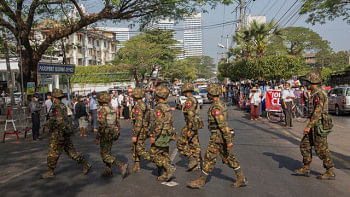No land, no legacy

Property ownership, or the lack of it, determines whether a woman's death is formally recorded in Bangladesh, reveals a new study by BRAC James P Grant School of Public Health (JPGSPH).
Titled "Barriers to and Facilitators of Female Death Registration in Bangladesh", the study found that families often forgo registering a woman's death because she owned no assets, owed nothing, and left nothing behind, effectively erasing her from official records.
Where death registrations do take place, they are rarely about honouring the deceased, the study shows. Instead, they are often driven by practical concerns such as settling loans or savings, claiming social protection benefits, or transferring property rights.
The study was conducted by BRAC JPGSPH, BRAC University, in partnership with the Gender Equity Unit of the Data for Health Initiative at Johns Hopkins University and Vital Strategies, with support from Bloomberg Philanthropies. Its findings were presented yesterday at a city hotel.
Conducted in Rangpur Division, the research aimed to uncover the underlying causes of gender disparities in death registration and identify actionable solutions. Despite national efforts to strengthen the civil registration and vital statistics (CRVS) system, Bangladesh continues to record a low proportion of deaths, particularly among women.
Rangpur has the lowest rate of female death registrations in the country, with significant variation within the division -- 22 percent in Dinajpur, the highest, compared to just 4 percent in Panchagarh.
One respondent told researchers, "I didn't register my mother's death. It's the same as always, the usual reasons. My mother didn't have any land-related matters. I'm talking about inheritance -- sometimes there's property from the mother's side, like from the grandmother or grandfather. When families are willing to divide property, that's when death registration becomes necessary. But in our case, there were no such property issues, and that's why I didn't do it."
The study also identified additional barriers to death registration, including low awareness of its benefits, especially in rural areas; the lack of essential documents such as digital birth certificates; and institutional hurdles like understaffing and poor inter-agency coordination.
Factors that encourage registration include better access to registration offices, higher digital literacy, and active involvement of community figures such as teachers and local leaders who assist families through the process.
Speaking at the event, Mamunur Rashid, joint secretary at the Health Services Division of the health and family welfare ministry, acknowledged the gender gap and its consequences.
"The data clearly show significant gaps -- particularly in female death registration. In Rangpur, for instance, only 32 percent of the recorded deaths in 2023–2024 were female. That's 6,537 out of 20,202 deaths.
"One of the main barriers is that very few women in rural areas own land or property, so families often don't see a reason to register their deaths. But this must change. These gaps have serious implications for equity and public health."
Zahid Hossain, registrar general at the Office of the Registrar General (Birth and Death Registration) of the LGRD ministry, in his speech emphasised the urgency of coordinated action.
"There is a clear and persistent disparity between male and female death registration, and this is now becoming a public policy issue… While we've made good progress with digitisation, strong collaboration among authorities is critical. Civil society, NGOs, and government agencies must coordinate more effectively at all levels to ensure no one is left out of the civil registration system."
Professor Dr Farhana Dewan, president of the Obstetrical and Gynaecological Society of Bangladesh, spoke about the medical community's role.
"We still have a long way to go if we want to meet our SDG targets by 2030. As doctors, we are often the first point of contact when a woman dies. It's not just about raising awareness among patients; we also have a responsibility. Health professionals can play a pivotal role by informing and guiding families to complete the death registration process."
The study recommends enhancing public awareness around death registration, with a focus on gender-sensitive messaging to ensure families understand its importance for women.
It also calls for simplifying the process and removing costs that discourage families from registering female deaths, particularly in low-income and rural communities.
Building human resource capacity at registration offices was identified as a priority to improve service delivery and reduce delays.
The study also suggests expanding the legal and administrative utility of death certificates, linking registration to essential services and legal processes.
Other recommendations include providing targeted legal incentives and strengthening grassroots-level communication strategies to support families through the process.
Researchers and participants at the study's unveiling stressed that ensuring women are counted in both life and death is essential to building an equitable society. Strengthening gender-responsive civil registration systems, they noted, is key to meeting Bangladesh's development and human rights goals.

 For all latest news, follow The Daily Star's Google News channel.
For all latest news, follow The Daily Star's Google News channel. 



Comments